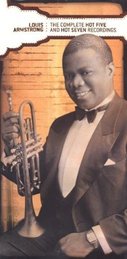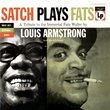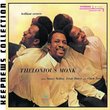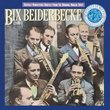| All Artists: Louis Armstrong Title: Complete Hot Five & Hot Seven Recordings Members Wishing: 5 Total Copies: 0 Label: Sony Original Release Date: 8/22/2000 Release Date: 8/22/2000 Album Type: Box set Genres: Jazz, Pop Styles: New Orleans Jazz, Traditional Jazz & Ragtime, Dixieland Number of Discs: 4 SwapaCD Credits: 4 UPC: 074646352724 |
Search - Louis Armstrong :: Complete Hot Five & Hot Seven Recordings
 | Louis Armstrong Complete Hot Five & Hot Seven Recordings Genres: Jazz, Pop
Everybody knows Louis Armstrong--even if it's just for his heart-pleasing renditions of "Hello Dolly" and "What a Wonderful World." Well, this four-CD box set marking the 100th anniversary of his birth--give or take a year... more » |
Larger Image |
CD DetailsSynopsis
Amazon.com Everybody knows Louis Armstrong--even if it's just for his heart-pleasing renditions of "Hello Dolly" and "What a Wonderful World." Well, this four-CD box set marking the 100th anniversary of his birth--give or take a year--contains some of his most groundbreaking, historic works. Recorded between 1925 and 1929, the Complete Hot Five and Hot Seven Recordings find Armstrong with more than able cohorts, including pianists Earl "Fatha" Hines and Lillian Hardin (Armstrong's second wife), clarinetist-saxophonist Johnny Dodds, and trombonist Kid Ory. Recorded when Armstrong was emerging from the influence of his idol, Joe "King" Oliver, these sides feature the main staples of the Armstrong canon, including "Potato Head Blues," "Big Butter and Egg Man," "Cornet Chop Suey" and the Armstrong-Hines duet "Weather Bird." The jewel of the collection is "West End Blues," with Armstrong's stratospheric, pyramid-structured solo, which ranks as one of the greatest in the history of music. The sessions also mark an important technological breakthrough, with the transition from acoustic to electrical recording. Armstrong's virtuosity on the cornet and trumpet alone would have been enough to ensure his fame. On the 1927 song "Heebie Jeebies," he forgot the lyrics and scatted them and became the first jazz singer, paving the way for Sarah Vaughan, Ella Fitzgerald, and Betty Carter. All in all, this set shows that Louis Armstrong's heroic talents enabled him to become the alpha and omega of 20th century music. As author Robert O'Meally, who wrote the superb liner notes to this well-packaged collection, puts it, "like Chaucer's poetry, which virtually begins the process of codifying the English language as a medium for sophisticated versification, Armstrong's Hot Fives and Hot Sevens provide a wide launching pad from which the history of the art of jazz takes flight." --Eugene Holley Jr. Similar CDs
|
CD ReviewsLoads of fun...Worth every penny spent. Nathan L. Stanley | 03/29/2007 (5 out of 5 stars) "I know...I know...it's music from the 1920's, the sort of music that one could not blare on the car stereo while cruising down the strip on a Friday night without getting strange looks from people. But, it's very fun and it literally brings a smile to my face. Louis's vocals on songs like A Monday Date, Hotter Than That, Gully Low Blues, Basin Street Blues, and many more, are a perfect way to bring someone out of a deep depression. In sum, the music is loads of fun. And for the serious jazz collectors and aficionados, there is much to appreciate in great tunes such as West End Blues, Tight Like This, and Wild Man Blues. Added to all this is the fact that the sound on this Sony/Columbia Legacy reissue is terrific, despite some crackles and pops. Each instrumentalist can be heard much more distinctly than in previous editions such as the Portrait of the Artist as a Young Man compilation. If I have children, I'd raise them on this kind of wonderful music." Music 5 stars of course, packaging 1 star Stagliano | Springfield, PA United States | 10/08/2007 (5 out of 5 stars) "I luckily read the reviews before purchase and had the cashier (Borders) open before purchase. The first two indeed had glue on the CD's, the third was the charm. Now to the music; how could you not enjoy these tunes? The cornet/trumpet playing of Louis is beyond belief especially when you consider these tracks are all done in one take. Kid Ory, Johnny Dodds, Lil Hardin-Armstrong and Johnny St. Cyr are also excellent musicians and complement Louis' playing. We also are introduced to Louis' vocals, but the real thrill is his cornet/trumpet playing; his solos would never be matched by any artist then or since. There are so many excellent tunes, to name them all would be to simply give the track listing for all CD's. My favorites include 'Heebie Jeebies', 'Cornet Chop Suey', 'Dropping Shucks', 'Potato Head Blues' and 'After You've Gone'. Most will notice I did not mention 'West End Blues', that is because this song needs to be singled out. What can you say about this song that hasn't already been said? This song is arguably the best, most influential sound recording of the 20th century. Each time you hear it you have to say "Wow". I also own the JSP box set and each has their good and bad points. Get both and lose yourself in early Louis which bears little resemblance to the Louis most are familiar with (No I'm not knocking the later Armstrong, I love it as well)." One More Time Richard W. Cutler | 11/28/2007 (5 out of 5 stars) "In college, I took a course in the philosophy of the "Modern." Our first assignment was to define "modern," and I borrowed a friend's tape recorder and copied "Potato Head Blues" from my Columbia LP. To the spool I attached a note that said "Listen to the improvised solo, and then listen again." My professor --a sculptor as well as an academic-- returned the spool with his own note that said I kept him from doing any work for two hours, because all he could do was play it over and over again. In fact, that is precisely what happened to me when I heard that unbelievable track for the first time.
This is the seminal music of the most important musician of the Twentieth Century. He is joined by colleagues who on their own were most-highly- regarded, but especially for younger folk, who only knew Armstrong as the artist-entertainer or amazingly popular singer of songs often with only middling value, here is the humble revolutionary. Armstrong takes what he learned and simply transforms it into a unique, lasting idiom --nothing less than that. He defines the standards of jazz forever, and he does it so completely that you will be thunderstruck. He invents popular singing, he leads an intensely swinging series of groups, and most of all he plays trumpet. Technically, he may have been the greatest player of his instrument ever --no matter the category of music. But his improvisations soar with a simplicity that goes to the marrow of art. One critic has called architecture "frozen music," and Armstrong's solos, and forgive me if I just hear "Potato Head" over and over in my mind as I write, are perfectly defined as "liquid architecture." And now, if you will excuse me, I think I will listen to some music...again...and again...." |

 Track Listings (24) - Disc #1
Track Listings (24) - Disc #1

